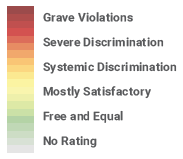Ranking Index 2019
Below you can download the two ranked lists of all countries featured in the Report as at October 2019, when the 2019 edition of the Freedom of Thought Report is published.
The ranking index is an extension of our Ratings System. The base score for each country is calculated by adding how many boundary conditions are applied to a country, with more severe boundary conditions adding more weight (green “all-clear” conditions add no weight). The higher a country’s base score, the worse that country has performed. The ranking is simply the consecutive position of each country’s base score. Countries with the same base score therefore share the same position in the ranking.
Click the country name to read the full narrative report and see the full rating table for every country.

As elsewhere on the site, the “Signal light” system is an at-a-glance summary of the Ratings Table for each country: it shows the colour (corresponding to the severity) of the most severe boundary condition applied in each of our four thematic strands. To see all the specific boundary conditions applied for any given country, visit the country’s page to see the country’s full Ratings Table.
The four thematic strands are: “Constitution and government” (Const/Govt); “Education and children’s rights” (Edu/Child); “Society, community and family (Society/Comm); and “Freedom of expression, advocacy of humanist values” (Expression).
NOTE: These rankings reflect the considerations in this Report. There is a heavy emphasis on various kinds of formal or legal discrimination. We are not able to produce a full, qualitative assessment of societal factors or personal experience. Countries about which we have more information are likely to receive worse results. See also “Editorial Introduction 2018: Some words of caution”.
You can also find our full data with all boundary conditions for every country, which contribute to the base score and final ranking, on our dedicated Open Data page.


